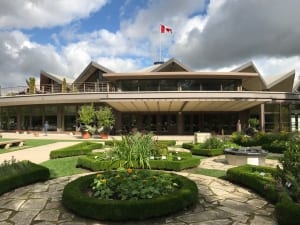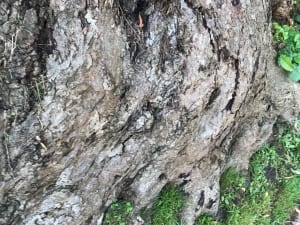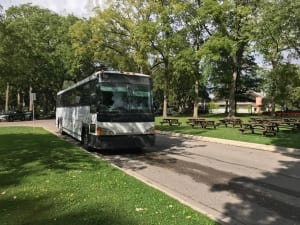Can rule of law address phenomena whereby power ‘speaks its own language’?
I launched this website a decade ago.
Among the topics that people visiting the site have found of interest are posts about Erving Goffman, scams and scamming, issues involving rights of way, and how to prepare for a presentation at a committee of adjustment meeting.
Site visitors have also expressed interest in posts about local history including history related to neighbourhoods in Ontario and Quebec among other places in the world. I have written about these neighbourhoods because in many cases I have spent years exploring them, as a participant-observer.

Tom Patterson Theatre Centre construction site in Straford: view looking west from Morenz Drive near corner of Morenz Drive and Lakeside Drive. The quotation, which has been split into two parts, from The Taming of the Shrew, reads: “They’re busy within.” Jaan Pill photo
Speaking for myself, I’ve learned many things, through blogging.
A key thing that I’ve learned is that blogging involves a part of one’s self that explores things independently, in a sense, from other parts of one’s self.
At first, when I worked on some of my earliest posts, it occurred to me that I was writing about some things where the inner logic of what I was communicating was not readily evident, including, at times, to myself.
Over time, I’ve learned that the inner logic is, indeed, nevertheless in place, and warrants attending to. The inner logic that I refer to is the inner logic of blogging.
Inner logic of blogging
Such a logic to an extent – and I emphasize ‘to an extent’ – follows a way of thinking that is illustrated by a book by John Holt, written many years ago, entitled: Instead of Education: Ways to Help People Do Things Better (2004).
A blurb for the book reads:
Instead of Education is Holt’s most direct and radical challenge to the educational status quo and a clarion call to parents to save their children from schools of all kinds. In this breakthrough work Holt lays out the foundation for un-schooling as the vital path to self-directed learning and a creative life.

Festival Theatre located in parkland east of the corner of Ballantyne Ave. and Queen Street. Jaan Pill photo
The home-schooling movement, which has grown since the time that John Holt advocated on behalf of such a movement, has positive and less than positive aspects. The positive aspects include the emphasis on ‘self-directed learning and a creative life.’ I see Greta Thunberg as an inspiring and significant exemplar of self-directed learning.
The negative aspects include the fact that home-schooling can, at times, provide cover for indoctrination of children, and can provide cover for abuse of children, by people who do not have the best interests of children at heart.
That is to say, at times people have taken the rhetoric of home schooling and have used that as a cover for doing things that serve objectives that have no relevance whatever to the well-being of children, and are in no way aligned to the concepts that John Holt championed.
Rhetoric by its nature can readily defy logic and evidence
One can sum up by saying that rhetoric by its nature can readily defy logic and evidence. In this case, the logic and evidence that I refer to is the logic and evidence whereby John Holt and other writers such as Ivan Illich backed up their message regarding the nature of education, and the nature of schooling.

Detail of tree stump located on south side of Water Street opposite the Tom Patterson Theatre Centre construction site between Morenz Drive and Wellington Street. What is noteworthy about the stump is that as a dead tree decays, it loses the clearly expressed, crisp and brisk delineation of form that is evident when a tree is still alive. Jaan Pill photo
I believe that the Reggio Emilia approach to early childhood education makes good sense and I also believe that this is an approach that has managed to avoid the distortions that have, at times, arisen within the home-schooling movement.
By distortions I refer to the fact that, at times, John Holt’s ideas have been twisted out of shape, to advance causes that (from what I remember from reading his books extensively in the 1970s) he would not have advocated.
Can rule of law address phenomena whereby power ‘speaks its own language?’
I have also written, over the past decade, about land use decision making and the frames of reference within which land use has functioned historically, and within which it functions in the present moment.
A key feature of land use decision making is that at times a person comes up with intriguing anomalies. It is possible, however, that these are not anomalies but, perhaps, represent the ‘language that power speaks.’
I refer, by way of example, to phenomena highlighted at a previous post entitled:
A key highlight from the post, based on investigation of a claim made by city staff at the above-noted meeting, reads:
In contradiction to what city staffers claimed at a April 4, 2018 meeting … , prior permission from media relations at the city is not required, in order for a blogger to record what city officials say at a public meeting.
The wider topic we are dealing with, in relation to land use, in the above-noted case among other cases I have encountered, concerns the fact that power at times ‘speaks its own language,’ whereby up is down, in is out, and large is small.

View of Tom Patterson Theatre Centre construction site looking north from Water Street. Jaan Pill photo
I have explored the wider topic in the context of evidence, evidence-based practice, authoritarianism, totalitarianism, and the history of witch hunts in European history.
What has prompted the current post?
I have written the post as a response to thoughts that occurred to me when I read an Oct. 11, 2019 Associated Press article entitled: “Analysis: Impeachment fight tests Constitution’s limits.”
Tom Patterson Theatre Centre construction Site
Over the past year, I have been documenting construction of the Tom Patterson Theatre Centre construction site in Stratford. Among the topics that interest me, with regard to the history of land use in Stratford, are:
- Physiographic history of the Avon River flood plain dating back to end of the last Ice Age, 10,000-plus years ago
- History of Indigenous land use prior to arrival of Western settler society
- History whereby park system along Avon River was developed and, in the early 1900s, saved from destruction when a Stratford referendum defeated a proposal to build a railway line along the south side of the river
- History of successful launch of the Stratford Festival, along the Avon River park system, in 1952
- History of the Tom Patterson Theatre Centre site dating back to when a lawn bowling facility, and an Optimist building, were features of the site
- Current narratives related to presence of a VIP lounge at the Tom Patterson Theatre Centre site
I have addressed the interesting topic of the VIP lounge at a post entitled:
A related post, at which Tyrone Guthrie is quoted, is entitled:
June 2, 2019 Fly-In Charity Breakfast at Stratford airport was a most enjoyable event
Lying
An Oct. 18, 2019 Daily Hampshire Gazette article is entitled: “Guest column Andrea Ayvazian: Lying and its unrelenting damage.”
An excerpt reads:
Bok’s words burrowed deep inside me — her book about lying is one of the seminal books that shaped my thinking as a 20-something. One line from her conclusion made a particularly strong impression on me: “Trust and integrity are precious resources, easily squandered, hard to regain. They can thrive only on a foundation of respect for veracity.”
I clung to the Bok book through my many moves as a young adult, packing and unpacking it as I relocated from state to state and apartment to apartment. But somewhere along the way I lost the book. This week I went to the library and took the Bok book off the shelf.
There was everything I remembered — the chapter headings, the quotes from Augustine, Aquinas, Kant, Bonhoeffer, Shakespeare, Tolstoy, and Freud, the discussions of white lies, excuses, lies in a crisis, lying to liars, lying to enemies, lies to protect peers and clients, lies for the public good and lies to the sick and dying.
When I first read the Bok book in 1979, I was not a stranger to the idea of political deception because I had been in college during the Vietnam War. The web of lies that entangled so many elected officials during that war and eventually brought down a president were familiar to me, and part of my coming of age as an activist.
But Bok’s book stirred something new inside me. Her words and examples page after page made me realize the deeply corrosive nature of lying and lies. Like the drip, drip, drip of acid on metal, lying eats away at trust, confidence, faith and resilience between and among individuals, families, communities, and even an entire country.


Leave a Reply
Want to join the discussion?Feel free to contribute!